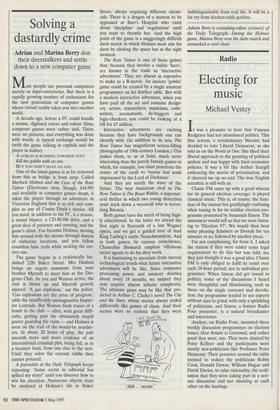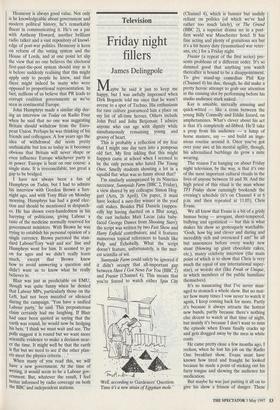Radio
Electing for music
Michael Vestey
It was a pleasure to hear that Vanessa Redgrave had not abandoned politics. This fine actress, a revolutionary Marxist, had decided to vote Liberal Democrat, as she told us on the World at One. She liked their liberal approach to the granting of political asylum and was happy with their economic policies. It was a bit like Arthur Scargill embracing the merits of privatisation, and it cheered me up no end. The true English eccentric is still with us.
Classic FM came up with a good wheeze for its general election coverage: it played classical music. This is, of course, the func- tion of the station but gratifyingly confusing when tuning in for its midday election pro- gramme presented by Susannah Simon. The announcer would tell us that we were listen- ing to 'Election 97'. We would then hear some pleasing Schubert or Dvorak for ten minutes or so, followed by another piece.
I'm not complaining, far from it. I asked the station if they were under some legal requirement to do this but was told, no, they just thought it was a good idea. Classic FM is only obliged to fulfil its remit over each 24-hour period, not in individual pro- grammes. When Simon did get round to politics, some of the discussions I heard were thoughtful and illuminating, such as those on the single currency and devolu- tion; the programme tended to use experts without axes to grind, with only a sprinkling of politicians, and Simon, a former Radio Four presenter, is a natural broadcaster and interviewer.
Analysis, on Radio Four, mounted three weekly discussion programmes on election issues, How Britain is Governed, and rather good they were, too. They were chaired by Peter Kellner and the participants were mostly non-politicians like Professor Peter Hennessy. Their presence around the table seemed to reduce the politicians Robin Cook, Donald Dewar, William Hague and David Davies, to calm rationality, the reali- sation that they were taking part in a seri- ous discussion and not shouting at each other on the hustings. Hennessy is always good value. Not only is he knowledgeable about government and modern political history, he's remarkably fluent in communicating it. He's on a par with Anthony Howard, another brilliant radio talker and a vast repository of knowl- edge of post-war politics. Hennessy is keen on reform of the voting system and the House of Lords, and at one point let slip the view that no one believes the electoral first-past-the-post system should stay as it is before suddenly realising that this might apply only to people he knew, and that there might indeed be many who were opposed to proportional representation. In fact, millions of us believe that PR leads to corrupt coalition governments as we've seen in continental Europe.
John Humphrys made a similar slip dur- ing an interview on Today on Radio Four when he said that no one was suggesting Britain should withdraw from the Euro- pean Union. Perhaps he was thinking of his friends and colleagues. A few years ago the idea of withdrawal did seem pretty unthinkable but less so today as it becomes obvious that Britain will never shape or even influence Europe whichever party is in power. Europe is bent on one course: a single state. It is irreconcilable, too great a gap to be bridged.
I have not always been a fan of Humphrys on Today, but I had to admire his interview with Gordon Brown a fort- night ago, and with Tony Blair on Monday morning. Humphrys has had a good elec- tion and should be mentioned in despatch- es. He has shown even-handedness in his harrying of politicians, giving Labour a taste of the medicine normally reserved for government ministers. With Brown he was trying to establish his personal opinion of a single currency. Brown parroted the stan- dard Labour/Tory 'wait and see' line and Humphrys went for him. It seemed to go on for ages and we didn't really learn much, except that Brown knew how to avoid answering a question and didn't want us to know what he really believes in.
Blair was just as predictable on EMU, though was quite funny when he denied that Labour MPs, particularly those on the Left, had not been muzzled or silenced during the campaign. 'You have a unified Labour party,' he said. This preposterous claim certainly had me laughing. If Blair had once been quoted as saying that the earth was round, he would now be hedging his bets. 'I think we must wait and see. The polls suggest it is round but we want more scientific evidence to make a decision near- er the time. It might well be that the earth is flat but we need to see if the other plan- ets meet the physics criteria ...'
When many of you read this, we will have a new government. At the time of writing, it would seem to be a Labour gov- ernment. But, whatever the result, I feel better informed by radio coverage on both the BBC and independent stations.



































































 Previous page
Previous page